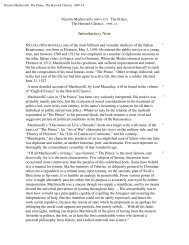Notre Dame de Paris - Bartleby.com
Notre Dame de Paris - Bartleby.com
Notre Dame de Paris - Bartleby.com
You also want an ePaper? Increase the reach of your titles
YUMPU automatically turns print PDFs into web optimized ePapers that Google loves.
est of her possessions to the poor and to God. The inconsolable lady had lingered on for twenty years<br />
awaiting <strong>de</strong>ath in this premature tomb, praying night and day for the soul of her father, making her bed<br />
on the cold ground without even a stone for a pillow, clothed in sackcloth, and living only upon such<br />
bread and water as the <strong>com</strong>passionate might <strong>de</strong>posit on the ledge of her window—thus receiving charity<br />
after bestowing it. At her <strong>de</strong>ath, at the moment of her passing to another sepulchre, she had bequeathed<br />
this one in perpetuity to women in affliction—mothers, widows, or mai<strong>de</strong>ns—who should have many<br />
prayers to offer up on behalf of others or of themselves, and should choose to bury themselves alive for<br />
some great grief or some great penitence. The poor of her time had honoured her funeral with tears and<br />
benedictions; but, to their great regret, the pious lady had been unable to receive canonization for lack of<br />
interest in the right quarter. Nevertheless, those among them who were not quite so pious as they should<br />
have been, trusting that the matter might be more easily arranged in heaven than in Rome, had frankly<br />
offered up their prayers for the <strong>de</strong>ceased to God himself, in <strong>de</strong>fault of the Pope. The majority, however,<br />
had contented themselves with holding Rolan<strong>de</strong>’s memory sacred, and converting her rags into relics.<br />
The town, for its part, had foun<strong>de</strong>d, in pursuance of the lady’s intention, a public breviary, which had<br />
been permanently fixed besi<strong>de</strong> the window of the cell, that the passer-by might halt there for a moment,<br />
if only to pray; that prayer might suggest almsgiving, and thus the poor recluses, inheriting the stone cell<br />
of Mme. Rolan<strong>de</strong>, be saved from perishing outright of hunger and neglect.<br />
These living tombs were by no means rare in the cities of the Middle Ages. Not infrequently, in the very<br />
midst of the busiest street, the most crow<strong>de</strong>d, noisy market-place, un<strong>de</strong>r the very hoofs of the horses and<br />
wheels of the wagons, you might <strong>com</strong>e upon a vault, a pit, a walled and grated cell, out of the <strong>de</strong>pths of<br />
which a human being, voluntarily <strong>de</strong>dicated to some everlasting lamentation, or some great expiation,<br />
offered up prayer unceasingly day and night.<br />
But all the reflections that such a strange spectacle would awaken in us at the present day; that horrible<br />
cell; a sort of intermediate link between the dwelling and the grave, between the cemetery and the city;<br />
that living being cut off from the <strong>com</strong>munion of mankind and already numbered with the <strong>de</strong>ad; that lamp<br />
consuming its last drop of oil in the darkness; that remnant of life flickering out in the pit; that whisper,<br />
that voice, that never-ending prayer encased in stone: that eye already illumined by another sun; that ear<br />
inclined attentive to the walls of a tomb; that soul imprisoned in a body, itself a prisoner within that<br />
dungeon, and from out that double incarnation of flesh and stone, the perpetual plaint of a soul in<br />
agony—nothing of all this reached the apprehension of the crowd. The piety of that day, little given to<br />
analyzing or subtle reasoning, did not regard a religious act from so many points of view. It accepted the<br />
thing as a whole, honoured, lau<strong>de</strong>d, and if need be, ma<strong>de</strong> a saint of the sacrifice, but did not dwell upon<br />
its sufferings nor even greatly pity it. From time to time the charitable world brought some dole to the<br />
wretched penitent, peered through the window to see if he yet lived, was ignorant of his name, scarcely<br />
knew how many years ago he had begun to die, and to the stranger who questioned them respecting the<br />
living skeleton rotting in that cave, they would simply answer: “It is the recluse.”<br />
This was the way they looked at things in those days, without metaphysics, neither enlarging nor<br />
diminishing, with the naked eye. The microscope had not been invented yet for the examination either of<br />
material or spiritual objects.<br />
Examples of this kind of living burial in the heart of the town were, although they excited but little<br />
remark, frequently to be met with, as we have said before. In <strong>Paris</strong> there was a consi<strong>de</strong>rable number of<br />
these cells of penitence and prayer, and nearly all of them were occupied. It is true the clergy took<br />
particular care that they should not be left empty, as that implied lukewarmness in the faithful; so when










